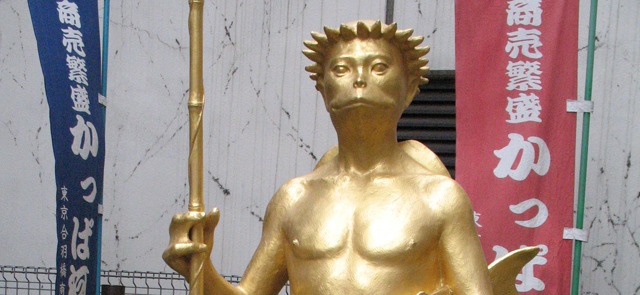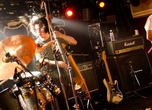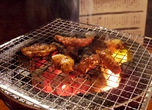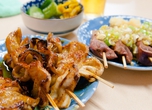Tokyo by area: Kappabashi
A taste of Tokyo's kitchen town

Posted: Wed Oct 14 2009
A cup of green tea for ¥3,000, a delicious chicken and egg rice bowl for ¥7,000, a rice ball for ¥2,400 and a sliver of sushi for ¥1,200. It may sound outrageously expensive, but these delectable delights are yours for the taking in Kappabashi. Don't brandish your chopsticks just yet, though — you'd be awfully disappointed by the taste.
These are the prices for Japan's famous plastic food samples, available in every variety imaginable in a number of shops along Kappabashi street, Tokyo's 800-meter-long restaurant supply boulevard. Nestled between Asakusa and Ueno stations (nearest subway stop: the Ginza Line’s Tawaramachi station), Kappabashi is to restaurant and kitchen supplies what Tsukiji market is to fish.
Fake plastic food, however, is only the shiny tip of the Kappabashi iceberg. For the cooking maniac, this street is a little slice of heaven. The specialisation factor is what makes this street so unique. An entire shop full of disposable chopsticks, another shop dedicated to vinyl (not of the LP variety). One shop promises to sell everything you need to open your own soba restaurant. If you need a cash register, there's a shop for that too. If you ever should find yourself requiring a 10L can of demi-glace sauce, then you’re sorted.
There are, of course, many shops that skew more toward the housewife demographic. Check out one of many cooking implement stores (once you've had a non-stick rice scoop, you'll never go back), or any of the middle- to high-end Japanese, Chinese or Western pottery shops.
Yoshiko Fujita, who works in the retail shop of her family's tableware distributor Fujitashoji Co., Ltd., splashed a little cold water on the happy-go-lucky mood that prevailed on the street on a recent Monday afternoon.
‘The economic downturn has been really hard on the community, especially since the Lehmann Brothers shock of last year, it's been really bad,’ Fujita lamented. She went on to explain that although many shops have closed down in recent years, the general mix of shops on the street has stayed the same. ‘Some people complain that the street is so closed off, like when one shop goes under, the real estate doesn't usually ever get listed ... it just gets sorted out in the neighborhood. But the neighborhood is just taking care of itself,’ she said.
Despite the insiders-club impression this might give, delightfully modern Kappabashi Coffee challenges the notion that you have to be receiving a pension to get a cup of coffee around here. With about 30 different coffees and 15 different tea drinks to choose from, ranging in price from ¥450 and ¥800, Kappabashi Coffee is a sophisticated take on the old-style Japanese coffee shop. Menu includes breakfast, lunch and dinner offerings, and the location, more or less at the end of the Asakusa side of Kappabashi street, makes it an ideal place to refuel before investigating the Ueno side.
Be sure to stop in at the six-year-old Kappa shrine, a golden statue of the mythical Japanese frog-like sprite, whose mischievous legend (and similar sounding name to the area) inspired the street to adopt the Kappa as its mascot.
- Kappabashi Coffee
- Address: 3-25-11 Nishi Asakusa, Taito-ku
- Telephone: (03)5828 0308
- Open: Mon-Fri 8am-9pm, Sat-Sun 8am-8pm
Tags:
Tweets
- About Us |
- Work for Time Out |
- Send us info |
- Advertising |
- Mobile edition |
- Terms & Conditions |
- Privacy policy |
- Contact Us
Copyright © 2014 Time Out Tokyo














Add your comment